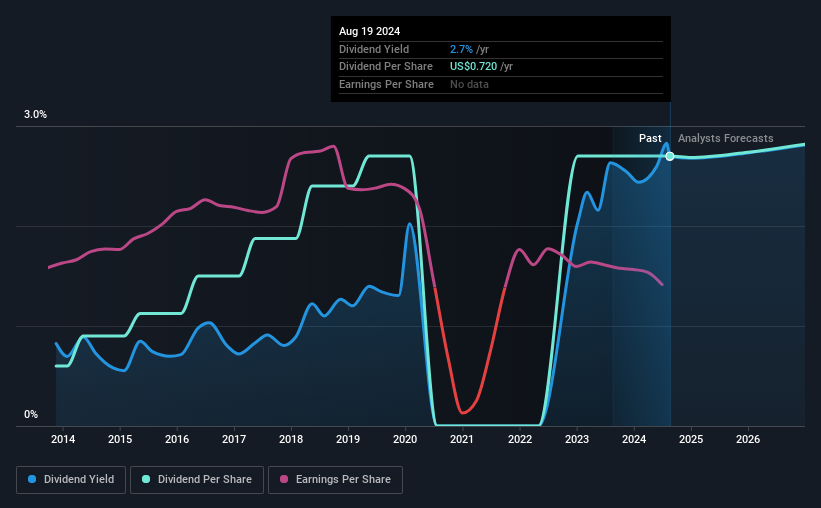
The board of Southwest Airlines Co. (NYSE:LUV) has announced that it will pay a dividend on the 25th of September, with investors receiving $0.18 per share. This payment means that the dividend yield will be 2.7%, which is around the industry average.
See our latest analysis for Southwest Airlines
Southwest Airlines' Dividend Is Well Covered By Earnings
Unless the payments are sustainable, the dividend yield doesn't mean too much. Before this announcement, Southwest Airlines was paying out 688% of what it was earning, and not generating any free cash flows either. This high of a dividend payment could start to put pressure on the balance sheet in the future.
Analysts expect a massive rise in earnings per share in the next year. If the dividend continues along recent trends, we estimate the payout ratio will be 32%, which would make us comfortable with the dividend's sustainability, despite the levels currently being elevated.

Dividend Volatility
The company has a long dividend track record, but it doesn't look great with cuts in the past. The dividend has gone from an annual total of $0.16 in 2014 to the most recent total annual payment of $0.72. This works out to be a compound annual growth rate (CAGR) of approximately 16% a year over that time. Despite the rapid growth in the dividend over the past number of years, we have seen the payments go down the past as well, so that makes us cautious.
Dividend Growth Potential Is Shaky
With a relatively unstable dividend, it's even more important to evaluate if earnings per share is growing, which could point to a growing dividend in the future. Over the past five years, it looks as though Southwest Airlines' EPS has declined at around 50% a year. A sharp decline in earnings per share is not great from from a dividend perspective. Even conservative payout ratios can come under pressure if earnings fall far enough. Over the next year, however, earnings are actually predicted to rise, but we would still be cautious until a track record of earnings growth can be built.
We're Not Big Fans Of Southwest Airlines' Dividend
Overall, while some might be pleased that the dividend wasn't cut, we think this may help Southwest Airlines make more consistent payments in the future. The company seems to be stretching itself a bit to make such big payments, but it doesn't appear they can be consistent over time. Overall, the dividend is not reliable enough to make this a good income stock.
Market movements attest to how highly valued a consistent dividend policy is compared to one which is more unpredictable. At the same time, there are other factors our readers should be conscious of before pouring capital into a stock. Just as an example, we've come across 3 warning signs for Southwest Airlines you should be aware of, and 2 of them can't be ignored. If you are a dividend investor, you might also want to look at our curated list of high yield dividend stocks.
New: Manage All Your Stock Portfolios in One Place
We've created the ultimate portfolio companion for stock investors, and it's free.
• Connect an unlimited number of Portfolios and see your total in one currency
• Be alerted to new Warning Signs or Risks via email or mobile
• Track the Fair Value of your stocks
Have feedback on this article? Concerned about the content? Get in touch with us directly. Alternatively, email editorial-team (at) simplywallst.com.
This article by Simply Wall St is general in nature. We provide commentary based on historical data and analyst forecasts only using an unbiased methodology and our articles are not intended to be financial advice. It does not constitute a recommendation to buy or sell any stock, and does not take account of your objectives, or your financial situation. We aim to bring you long-term focused analysis driven by fundamental data. Note that our analysis may not factor in the latest price-sensitive company announcements or qualitative material. Simply Wall St has no position in any stocks mentioned.
About NYSE:LUV
Southwest Airlines
Operates as a passenger airline company that provides scheduled air transportation services in the United States and near-international markets.
Fair value with moderate growth potential.
Similar Companies
Market Insights
Community Narratives


